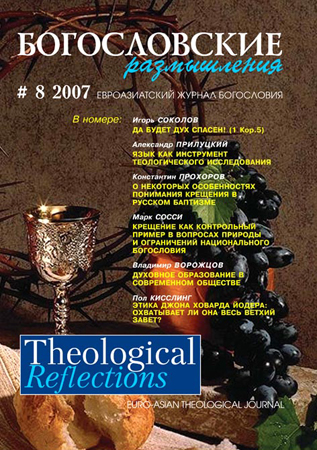Language as an Instrument of the Teological Study: as Related to the Specifics of the Eastern Theological Tradition
Keywords:
Language as an Instrument of the Teological Study, as Related to the Specifics of the Eastern Theological Tradition,Abstract
This article examines questions concerning the methodology of theological study as it relates to the traditions of Eastern theological discourse. The author analyzes the specifics of the theological term as the verbal means of expressing particular theological concepts. The development of Christian terminology is considered in the context of church history. In the conclusion the author considers the reasons for the sacralization of language in the Eastern tradition.
References
- Архиепископ Илларион (Троицкий). Очерки из истории догмата о Церкви. 1912.
- Interpretation, Journal of Bible and Theology, January 2006.
- James W. Watts Ritual legitimacy and Scriptural authority, Journal of Biblical Literature, Fall 2005, pp. 401-402.
- Joel B. Green. Scripture and Theology. Interpretations, April 2002.
- Kelly J.N.D. Early Christian Doctrines. London.1988.
- Kittel. Theological Dictionary of the New Testament. Vol.1.
- Macleod C.W. Allegory and Mysticism in Origen and Gregory of Nyssa // The Journal of Theological studies. New series. Vol.22, part ii (October 1971).
- Matthew J. Martin. Origen’s Theory of Language and First Two Columns of Hexapla Harvard. Theological Review, January 2004.
- Mittelman Аllan. Toleration, Liberty and Truth. Harvard Theological Review, April 2002.
Downloads
How to Cite
Issue
Section
License
Copyright (c) 2020 Alexander PRILUTSKII

This work is licensed under a Creative Commons Attribution-NonCommercial 4.0 International License.
All articles published in the Journal are distributed under a Creative Commons Attribution-NonCommercial 4.0 International License
By submitting an article for publication in Theological Reflections: Eastern European Journal of Theology the author grants the editors the right to publish the article and distribute it in electronic and print form.
The author reserves all copyrights and the right to use the materials of the article in whole or in part for educational purposes, to write his own dissertations, to prepare abstracts, conference reports, oral presentations, etc., as well as post electronic copies of articles (including the final electronic version downloaded from the journal’s official website) on non-commercial web-resources without the consent of the editorial board and founders.



